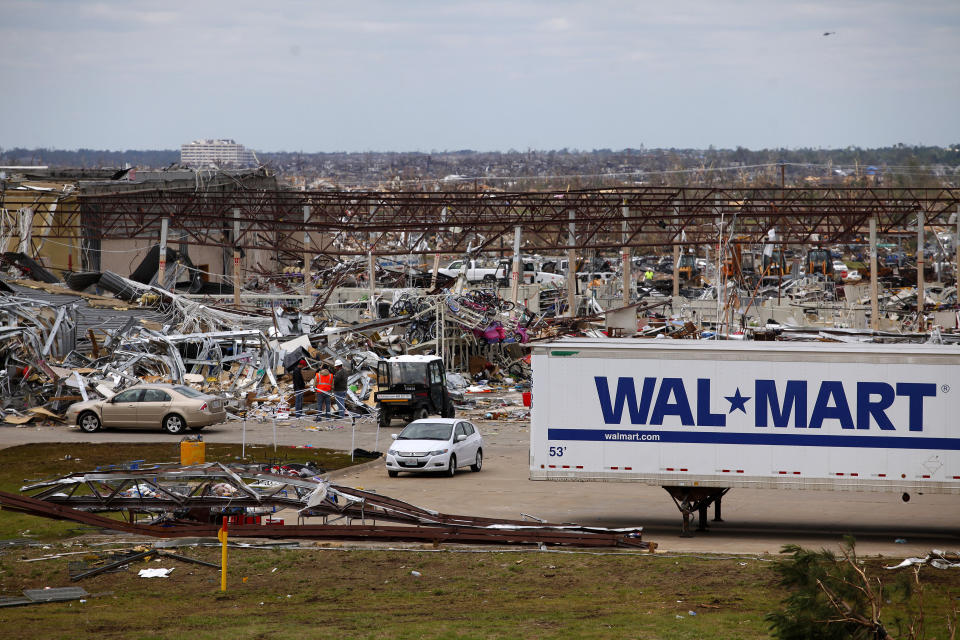Walmart outlines climate-friendly goal to decarbonize operations within 20 years
Walmart (WMT) is doubling-down its sustainability efforts to combat climate change, laying out a plan to be a zero-emission company across its global operations by 2040.
On Monday, Walmart CEO Doug McMillon said the world's biggest retailer wants to "play an important role in transforming the world's supply chains to be regenerative."
McMillon, who is also the chairman of the Business Roundtable, warned in a statement “we face a growing crisis of climate change and nature loss and we all need to take action with urgency.”
Walmart plans to power all of its 11,500 locations worldwide with renewable energy sources such as wind and solar by 2035. So far, the company powers around 30% of its operations from renewable energy. The company is targeting 50% by 2025, before hitting its newest target of 100% by 2035.
"That's the biggest part of our emission footprint today, so it's really important for us to make sure and get to that target," Zach Freeze, Walmart's senior director of strategic initiatives and sustainability, told Yahoo Finance in a Zoom call.
According to Freeze, another critical area for the company is electrifying and zeroing out emissions from its vehicles, including its fleet of long-haul trucks, by 2040.
"Transportation is a big part of our footprint as well, and our goal is to electrify or use renewable energy for our own fleet, so that includes anything from a passenger vehicle all the way to those long-haul heavy-duty what's referred to as those class-8 trucks, the big trucks that you see driving delivering products to our stores, powering those from renewable sources by 2040," Freeze added.
‘Ambitious and aspirational’

The company’s first public effort began in a 2005 speech on climate change. Walmart's then-CEO Lee Scott pledged what he characterized at the time as "ambitious and aspirational" goals to tackle climate change in a speech titled.
In that speech, Scott outlined objectives like Walmart being powered by 100% renewable energy, creating zero waste, and selling products that sustain resources and the environment.
In 2017, Walmart asked its expansive network of suppliers to join it with the launch of Project Gigaton, an initiative to avoid a gigaton of greenhouse gas emissions by 2030 across the supply chain. More than 2,300 of Walmart's suppliers have signed up for a total of 230 million metric tons removed so far.
"For 15 years, we have been partnering to do the work and continually raising our sustainability ambitions across climate action, nature, waste and people,” McMillion said in Walmart’s statement.
“The commitments we're making today not only aim to decarbonize Walmart's global operations, they also put us on the path to becoming a regenerative company – one that works to restore, renew and replenish in addition to preserving our planet, and encourages others to do the same," he added.
As part of the initiative, Walmart — which is also the biggest grocery store in the world — will also shift to low-impact refrigerants for cooling and electrified equipment for heating across its stores and distribution centers by 2040.
Additionally, the company is "transitioning away from anything related to fossil fuels," Freeze added, noting that the next decade "is a turning point" when companies like Walmart can encourage others to follow.
"This is the decade that counts. It's up to us and others to lead the way. It's good business — it's good for the planet, it's good the communities where we operate,” the executive said. “Ultimately, if we're taking good care of our customers, good care of the environment, it's going to be better for our business."
Freeze acknowledged that it's a difficult challenge that will take a lot of innovation and infrastructure.
"But, again, with that as our commitment, it's really going to push us to make this happen, and we are committed to do that with all of our fleet," Freeze said.
Julia La Roche is a Correspondent for Yahoo Finance. Follow her on Twitter.

 Yahoo Finance
Yahoo Finance 
